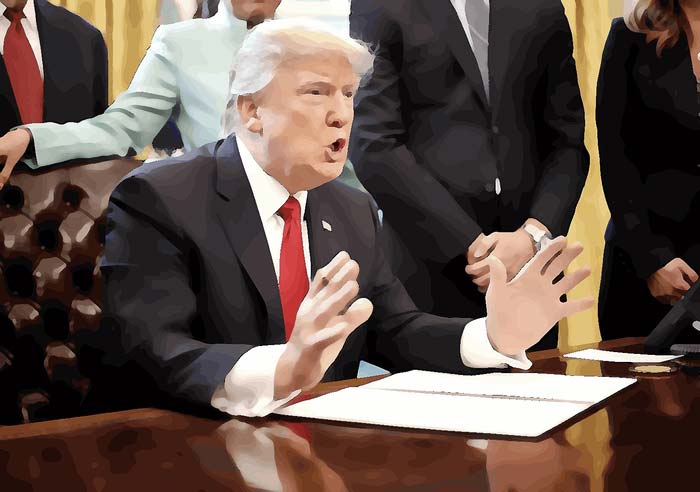
"Under my administration," Trump declared during a Rose Garden ceremony on the National Day of Prayer, "free speech does not end at the steps of a cathedral or synagogue or any other house of worship. We are giving our churches their voices back."
Executive orders have become something of a go-to presidential device in recent times, given that America's form of democracy is intentionally cumbersome against the Founding Fathers' suspicion of unchecked government authority.
To achieve something specific, a president can write up an executive order and seem to get it done, like a royal decree without a crown. George Washington issued eight of them, according to The American Presidency Project at the University of California, Santa Barbara. Franklin Roosevelt came up with more than 3,700. The modern average is about 300 per president, or one every 10 days or so over two terms.
The problem with executive orders, of course, is they can be legally challenged. See Trump's travel ban. They can simply be undone by a successor. See several of the 32 orders Trump signed in his first 100 days, one every three days.
Or they can turn out to be meaningless. Remember President Barack Obama's first full day in his first term, his grandiose photo op signing of an executive order to shut down the Guantanamo Bay detention facility? That prison for suspected terrorists is still running.
That Obama event was designed in part to fulfill a much-uttered campaign promise. Oh, look! So, was Trump's on religious freedom.
Countless times during the campaign Trump promised to reinforce religious freedoms and "totally destroy" the Johnson Amendment. While in Congress in 1954, future president Lyndon Johnson introduced a statute to the tax code that specifically prohibits all non-profits, including universities, foundations and churches, from endorsing political candidates.
Over the years some pastors and priests have come close, suggesting without names, for instance, that congregants surely wouldn't consider supporting candidates who - oh, say - favor abortion rights. Gee, who could that have been last November?
Exit polls back then had Democratic candidate Hillary Clinton losing evangelicals to Trump 80 to 16. Any president would seek to nourish such support. In a sad comment on modern politics, ostentatiously keeping a political promise has become notable.
Christians especially have voiced the greatest concerns that merely dangling the financially devastating threat of losing tax-exempt status was sufficient to censor free speech.
Occasional church-goer Trump agreed, calling it very unfair. "If a pastor, priest or imam speaks about issues of public or political importance," Trump said, "they are threatened with the loss of their tax-exempt status - a crippling financial punishment."
Trump was surrounded by numerous faith leaders including some Little Sisters of the Poor who fought Obamacare's birth control requirements. Some religious leaders wanted Trump's order to go further, which would surely have ignited lawsuits.
The president added: "This financial threat against the faith community is over."
Trump's order basically instructs the Internal Revenue Service to ignore that law while its actual repeal is written into upcoming tax reform legislation, as promised in the Republicans' 2016 platform.
Naturally, such blatant religious advocacy riled liberals, who threatened lawsuits. Public Citizen, a liberal outfit favoring strict campa
ign finance limitations, said it planned to challenge the order. "This executive order may go down in history as the Citizens United of church/state separation in the context of political spending," said Robert Weissman, president of Public Citizen.
Some Democrat senators raised the possible specter of dark forces funneling vast sums through churches for laundering.
Many campaigning candidates already speak and answer questions before religious groups. Realistically, Trump's IRS order may merely prompt more open appeals for endorsement.
What may actually have a more prolonged political impact for Trump was the simultaneous announcement of his first foreign trip late this month. To a standard European junket for G-7 and NATO meetings, Trump added initial stops in Saudi Arabia, Israel, the Vatican and another meeting with the Palestinian Authority president.
Even if the early trip provides only modest progress on subjects such as combating terrorism, the journey will provide days of saturation news coverage back home showing the new American leader, a Presbyterian, on the world stage - open, respectful and engaged with the capitals of three major faiths.


 Contact The Editor
Contact The Editor
 Articles By This Author
Articles By This Author